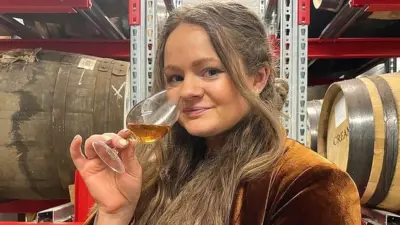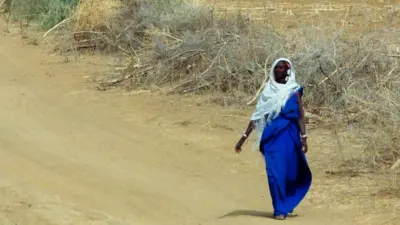We've updated our Privacy and Cookies Policy
We've made some important changes to our Privacy and Cookies Policy and we want you to know what this means for you and your data.
'Years to get children back on track after Covid'
- By Branwen Jeffreys
- Education Editor
At the start of the day Clare Marriott welcomes in children and parents as they arrive at Bishop's Primary School in Ashington.
The school is an anchor and a life raft for some of its families in this Northumberland town at the best of times.
Now, it is picking up the pieces after the pandemic, which left parents and children isolated and without routine support.
"Years, we're talking years," Mrs Marriot tells me when I ask how long it will take to get children back on track.
The parents are worried too about how behaviour and confidence have changed visibly in their children.
Jordi-Anne has two children, one in Reception and one in Year 5.
"They seem to be more irritable, their tempers seem to be more high. They're not engaging properly and they're not even working nicely as a group any more."
She has found it harder to persuade her two to go out and play with other children, but says being back at school is helping.
A big concern for the school is that some children are delayed in meeting basic milestones.
The lack of social contact in the pandemic has affected young children's speech and language across England, but this was a community already gripped by word poverty.
Among the two-year-olds benefiting from the government-funded 15 hours of childcare a week, they would usually expect nearly half to have almost no words.
Now Mrs Marriott tells me they are noticing other post-pandemic changes.
Parents have had less contact with health visitors, and the school had to stop home visits where advice is offered on preparing children to start school.
"We have some children who are still in nappies, still in pull-ups, not just in our early years but in Key Stage 1, and that is highly unusual."
Delayed development
This isn't the first time I've heard of five and six-year-olds in nappies, but schools in other deprived communities are reporting a similar increase this school year.
Changing children and supporting toilet training diverts the time and energy of teachers and teacher assistants, away from their top priority of helping pupils learn.
Mrs Marriot fears this increase in developmental delays is likely to persist for several years, and could be overlooked in a national push to catch up academically this year.
But lost learning is a worry too as all the evidence points to north-east England being worst effected.
Research by the Education Policy Institute for the government shows that this time last year primary children in the North East had lost five months of learning in maths.
That's twice the rate seen in London, and even the sustained effort since the second lockdown will not have made up for the disruption.
Bishop's Primary School is on a large campus in the centre of Ashington with Duke's Secondary School. Both are part of the Northumberland Church of England Academy Trust.
More than a third of children in the primary qualify for pupil premium, the top-up funding for children who have been entitled to free school meals in recent years.
At Duke's Secondary, 48% of pupils attract the pupil premium.
Ashington was once a coal town, but the pit closed in the 1980s, two decades after the rail link to Newcastle was lost.
In some families there have now been generations of unemployment, making it harder for schools to create a sense of opportunity through education.
Tutoring
These two schools have tapped into every bit of extra help or resources available through the £3.1bn committed by the government for education recovery across England.
The funding falls far short of what education unions, charities and the government's own former adviser Sir Kevan Collins have said is needed.
At these two Ashington schools, their share has helped pay for small-group tutoring and a summer school for children moving up from primary to secondary.
Alfie, now in Year 7, said it helped his social confidence: "I was mixing with other children and I hadn't done that for a long time".
Like many other pupils, Laney-Mae is discovering where the gaps are.
"I think it might be hard for all of us. When we go into class we're asked 'have you done this in primary' and sometimes we haven't," she said.
The head teacher at Dukes, Russ Atkinson, prefers not to talk about 'catch-up' as he doesn't want pupils to feel they can't aim high.
But Year 11s are getting an extra half an hour, four times a week, and all have laptops to help them study at home.
Before the disruption of coronavirus, the disadvantage gap in attainment between the poorest pupils and the better off had been narrowing in England.
Russ Atkinson predicts progress now will be slower.
"It has set back a lot of hard work that our school has put in to try to close the gap, and we fear we've taken a step back again, and we're almost starting again in a post-pandemic world," he said.
Ashington is due to get its rail link restored, and renewable energy is one of the growth areas for jobs.
But as in many communities, there is a fear that the widening of the disadvantage gap in education during the pandemic risks blighting the prospect of its young people.
Top Stories
Features & Analysis
Most read
Content is not available








